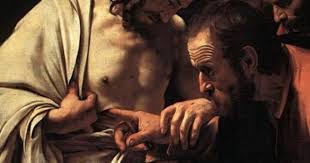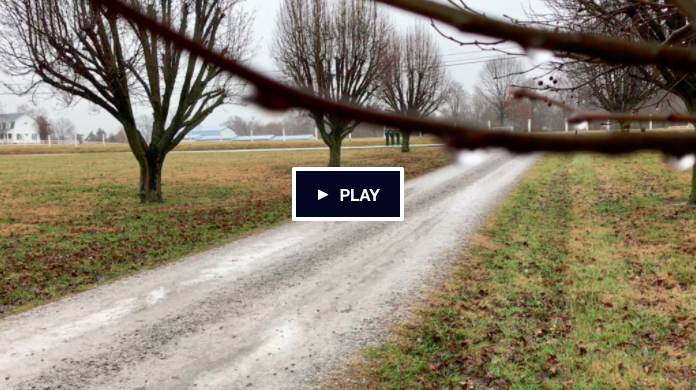 hope
hope Entries in hope (9)
Gazing at the Unseen
 Saturday, March 30, 2019 at 12:53PM
Saturday, March 30, 2019 at 12:53PM 
Have you ever stared off into space, not really focused on anything? Me too. In my experience such a gaze comes with another lack of focus: I find that my thoughts stop as well. That inner dialogue constantly yakking in my brain goes silent at the same time my vision goes blurred. (I know what you’re thinking: maybe he’s had a stroke!But I assure you I haven’t!)
Perhaps there is a physiological explanation for this kind of pause. I dunno. But there’s definitely a spiritual one. Consider this passage from the Apostle Paul:
Therefore we do not lose heart. Though outwardly we are wasting away, yet inwardly we are being renewed day by day. For our light and momentary troubles are achieving for us an eternal glory that far outweighs them all. So we fix our eyes not on what is seen, but on what is unseen, since what is seen is temporary, but what is unseen is eternal. (2 Corinthians 4:16-18)
Strangely, Paul says we “fix our eyes . . . on what is unseen.” How does one do that? How do we focus on what we cannot see?
Here is an exercise in meditation: to look beyond what is seen. Do you see the opportunity? This short passage begins with “There we do not lose heart . . .” The way toward hope, the discipline of hope, is to patiently discard every thought, every idea we can generate about our life or situation, and to gaze upon the unseen, to listen to the unspoken. In short: to simply be with Him.
Try this sometime: in a quiet place and in an unhurried way, set aside your ability to reason or even to verbalize your thoughts. Let your eyes and mind stare into Heaven’s space. You needn’t fear: if we ask for the Holy Spirit’s presence we can be sure the Spirit will meet us. Some of our most hope-filled moments will come not from what is seen, thought, or heard, but what enters our heart.
Hope & Promise
 Thursday, November 9, 2017 at 11:38AM
Thursday, November 9, 2017 at 11:38AM “By hope we lay hands on the substance of what we believe and by hope we possess the promise of God’s love.” ~ Thomas Merton
 The Father reaches out to us through his great and precious promises. Hope encourages us to reach toward him with both hands, ready to grasp his love.
The Father reaches out to us through his great and precious promises. Hope encourages us to reach toward him with both hands, ready to grasp his love.
I hear God’s promise, perhaps through reading the scripture or listening in prayer. The promise requires something of me: to believe, to hope. When I respond with hope the promise comes alive in me, it no longer resides in a book or as an idea, it becomes a living thing.
It’s too easy to reduce the words of God to principles and precepts, as if the Father is the Great Theology Lecturer in the Sky. But no: he is personal, intimate, and close. No amount of study can achieve this intimacy. Intellectuals value learning; the desperate value hope. God's promises are not grandiose proclamations from a mountaintop; they are love-words whispered in my ear—secrets known only to him and me. His promises are not the stuff of contracts and agreements that lawyers can parse and accountants measure; they are bread and wine that sustain my body and lift my spirit.
Each promise from God is personal, even if it is given to many people. Others might hear the very same words and stand unmoved or evaluate the promise with a critical eye. Trusting this promise is a high-risk strategy, they judge. There’s no guarantee of success; the odds are against this plan. But hope is not a strategy: it is birthed when the words of loving parent are received and treasured by a trusting child. We cannot really believe the promises of God until we take the dangerous step of trusting him.
The Apostle Peter understood the dynamic power released in us when place our hope in the promises of God. “Because of his glory and excellence,” he writes in the first chapter of II Peter , “he has given us great and precious promises. These are the promises that enable you to share his divine nature and escape the world’s corruption caused by human desires.” Hope leads us toward the divine nature and leads us away from the corrupting power of our own desires apart from his promises. It’s not that desire itself is bad; it’s that the promises of God are the proper object of desire. Our desires comfort, ease, security, wealth, and control actually corrupt our souls. Human desires apart from God’s promises will wear us down and break us apart—that’s what corruption is. But desire, when pointed toward God’s promises, become a life-giving tree, rooted deep within us. “Hope deferred makes the heart sick,” say the Proverbs, “But desire fulfilled is a tree of life.” When our hope is in anything other than the promises of God, we will find ourselves heartsick.
There is a modern word for this kind of heart sickness: cynicism. Cynicism is an infection that poisons the everyday blessings of life and multiplies the everyday problems of life. Despair is not the opposite of hope: cynicism is. Cynicism is anti-trust; it is the whispered voice of caution that flows from the self, a self separated from the love of God. It is the illness of our age, presented to us the wisdom of the worldly-wise, self-preservation masquerading intelligence.
Why is cynicism regarded as a useful tool for coping with life but hope is written off as wishful thinking? Hope is the more powerful force for change. Let others label hope as risky: the real risk is to live our lives as if God does not exist. The day will come when the scoffers and cynics will stand amazed that the small and the foolish were right all along: hope is the way forward.
"Discovering Hope" ~ A New Book ~ Via Kickstarter!
 Wednesday, March 15, 2017 at 09:02AM
Wednesday, March 15, 2017 at 09:02AM Friends: I'm so happy to announce the pre-lease of my next book, Discovering Hope, which is available only through a Kickstarter project:
This Kickstarter runs until March 30th, and I'd be so grateful if you'd take a look at this two-minute video that explains the vision of the book, scheduled for release in September (2017).
Be sure to check out the REWARD LEVELS (scroll down the right-hand side of the Kickstarter page), which include small Group packages for your church or organization, as well as personal rewards and special (small) thank-you's from me.
Heaven's Reservoir
 Monday, February 3, 2014 at 11:01AM
Monday, February 3, 2014 at 11:01AM  Somewhere in the heavens a giant reservoir holds an ingredient essential to life. Heaven is saturated with hope; nor does it stay in the skies, it rains upon us.
Somewhere in the heavens a giant reservoir holds an ingredient essential to life. Heaven is saturated with hope; nor does it stay in the skies, it rains upon us.
In the 21st century, “hope” is simply the poetic version of wishful thinking. In this present age “hope” is the stuff of dreams: thin as the air and the currency of desperation. Hope is a counterfeit traded by losers. Winners don’t need hope—they have success now.
Last night I read these amazing words: “the faith and love that spring from hope that is stored up for you in heaven.” (Colossians 1:5) The Apostle Paul was writing to a community of believers he had never met. He had heard of their faith in Jesus. He had heard of their love for one another. Paul knew immediately that these people had tapped into an eternal source capable of funding such faith and love. They had tapped into hope.
This is a revelation: in a place called “heaven,” where every need is met and there’s no more crying or sorrow, hope remains. Paul describes it as the stockpile of heaven, ready to energize faith and love in the here and now. Why would we love another person if there were no hope for them—or us? Why believe the promises of God for this life unless there is evidence that these promises are sure? The “hope of heaven” is not a destination; it’s a resource available to us now. Even in the valley of despair, a door of hope remains open, because heaven is open to us now. Hope is our anchor, but instead of casting it into the depths of the seas, we anchor our hope in the fact of heaven, that place where God’s Kingdom is lived to the full. Each student of Jesus would do well to reflect, how solid is my hope?, and in which direction have I cast my anchor?
Hope is the rebirth of divine certainty: through hope we see Jesus, the high king of heaven. We see his love toward us, and from him we draw the true necessities of life. Food, water, shelter, fame, money and sex are the illusions of necessity. Only three things remain untouched from this age into the next: faith, hope, and love. Hope is an abiding thing; it will outlast this world, and we will live forever in the hope of heaven.
Heaven's Reservoir
 Monday, February 3, 2014 at 11:01AM
Monday, February 3, 2014 at 11:01AM  Somewhere in the heavens a giant reservoir holds an ingredient essential to life. And, like every precious element held in reserve, it doesn’t do us much good until we draw upon it. Heaven is saturated with hope, nor does it stay in the skies, it rains upon us.
Somewhere in the heavens a giant reservoir holds an ingredient essential to life. And, like every precious element held in reserve, it doesn’t do us much good until we draw upon it. Heaven is saturated with hope, nor does it stay in the skies, it rains upon us.
In the 21st century, “hope” is simply the poetic version of wishful thinking. In this present age “hope” is the stuff of dreams: thin as the air and the currency of desperation. Hope is a counterfeit traded by losers. Winners don’t need hope—they have success now.
Last night I read these amazing words: “the faith and love that spring from hope that is stored up for you in heaven.” (Colossians 1:5) The Apostle Paul was writing to a community of believers he had never met. He had heard of their faith in Jesus. He had heard of their love for one another. Paul knew immediately that these people had tapped into an eternal source capable of funding such faith and love. They had tapped into hope.
This is a revelation: in a place called “heaven,” where every need is met and there’s no more crying or sorrow, hope remains. Paul describes it as the stockpile of heaven, ready to energize faith and love in the here and now. Why would we love another person if there were no hope for them—or us? Why believe the promises of God for this life unless there is evidence that these promises are sure? The “hope of heaven” is not a destination; it’s a resource available to us now. Even in the valley of despair, a door of hope remains open, because heaven is open to us now. Hope is our anchor, but instead of casting it into the depths of the seas, we anchor our hope in the fact of heaven, that place where God’s Kingdom is lived to the full. Each student of Jesus would do well to reflect, how solid is my hope?, and in which direction have I cast my anchor?
Hope is the rebirth of divine certainty: through hope we see Jesus, the high king of heaven. We see his love toward us, and from him we draw the true necessities of life. Food, water, shelter, fame, money and sex are the illusions of necessity. Only three things remain untouched from this age into the next: faith, hope, and love. Hope is an abiding thing; it will outlast this world, and we will live forever in the hope of heaven.



